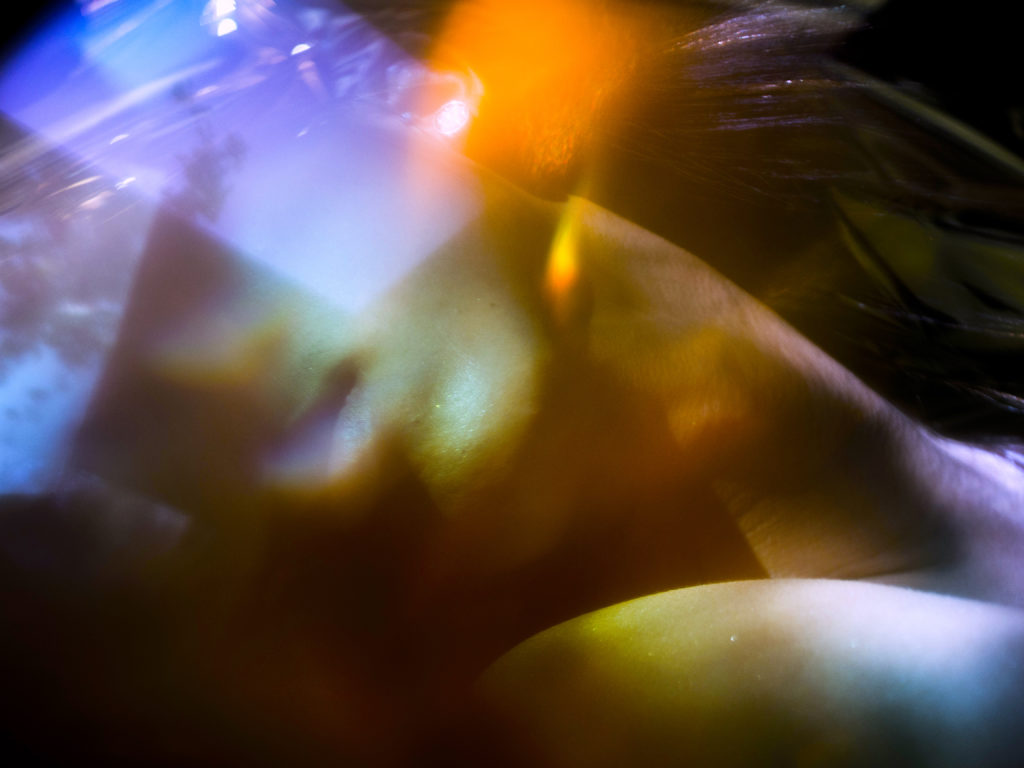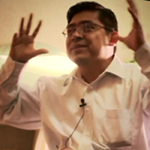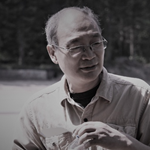THE AFTERNOON OF A FAUN
STÉPHANE MALLARMÉ
Say nymphs, and I would perpetruate them.
CLEAR
leering lightly
incarnate air’s voltage
and in taffeta tutus doze
I WOULD DREAM BRIEFLY
Ancient forever doubt
branches, becomes leafy
while real woods wood
that I offer myself
—sole triumph—
the perfect glitch
of inexistent roses.
LOADING. . .
Or if these femmes you faun-on
Are a figure of an emblem of a nerve!
Faun, l’illusion
Hap of blue use
cold shape of the miraculous!
One, the other
breathe in another
contrasts come like breezes in heatwaves . . .
your feathered hair.
Suffocating phallustrous chaleur
at dawn
That’s my reading flute murmur
or like that silent flick
L’Arroseur Arrosé, this is about
the poet’s garden hose
winding up on a half horse
like a prompt s’exhalation before
what scatters the sound in the dream,
yes that’s it, up at the unfluttered
edge the visible and serene heartbeat
In Japan, the girls carry themselves on Après-Midis and even bicycle on Daccarat Cruze: Le Nouveau Parfum du De De L’Eau Style du Mode Secret: such audacity, so spark—this floors me, sing it: “What some call a hollow read, I beat into Rosicrucian allegory and X-Rated allusion, gold threaded in the cloud musty far verdure-weed proffers its tendrils to fountains quiver the white beast odalisque.
(video black branch blanc beast sur la vide)
And what slow prelude is this?
This flight of swans, non!
A Naïad, a-leaping, on-plunging,
a-way!”
Perhaps the translator must insert
a rude awakening—that this poem
of a starlit être has within a scarlet
letter, all the homoerotic fun removed
from faun, although if it’s in the dream
(or in the poem) what is the line, the
violation of exactitude or
Inert, the moment leaves
no impression for whoever searches the “there”
finds that no art can
altogether combine here
the desire of that hour:
wake, then, wake to first fervor
correct and unique, under antique wavelengths illume,
only this lily! And the one of you all for guilelessness.
Otherwise, sweet dithering lips make their noise
a kiss which assures in the depths of uncertainty . . .
it is already December and this talk of “august teeth”
already a thousand aprés-midis have passed since I saw these
nymphs, a single morsel of time, a missed kiss gothicized
into a stanza played backwards to find the hidden message
which Satan has written in your emailing me after 25 years
from the dentist all this time and its dents and we are now suddenly
quotidiennes? My head is spinning, you say, if I hadn’t gone
to that reading (the poet had a voice like root canal) we might not
have seen each other again in this *dear life* and I email back
this stanza about teeth which confounds me, because, perhaps
les dents de décembre sont prudents
But, enough! A secret monolithic lute, confident
my junk—vast and doubled under azure we play
risking the trouble of a play
a dream, a long improvisation
the beauty all around us, the absence of confusion
between false and falsetto our true song
I’d go as far as to say that love is the modulation
evanescing, they do, the dull doses
of abs and the absence on which my longing eye closes,
sonority, vanity, monotony of line!
Twist out of this futile flute, O malign
Syrinx, a reflowering of the lake where we once relaxed!
As for me, this fiery sound, melting the wax I pipe-on
and on about Goddesses; such idolatry these paints,
such shadows again across dropped pants:
And see, when I have sucked the sun from a raisin
I no longer regret the single ray,
But, laughing raise to the heaven of summer this vacancy of grapes
And, puffing on their luminous peels, rapacious
For visions I cast across them the eye of the tigress
until evening is upon us.
O nymphs let us relive each detached caress
“My will, my jonquille, my junco partner, darting each enclosure
Immortal, noise of burning in the waves of the seashore,
Wobbly cries from within forest’s orb;
And splendid head of hair absorbed
Into glitterings and frisson, for pete’s sake!
I run; feet entangled (I ache,
I am bruised with the languorous taste
of the evil of being two’d)
by the alarmingly lurching arms
of slumbering nymphs entwined;
Raving, ravishing, I’m not une
unentangled
unimplicated
And take umbrage in this clump, enraged
by sun’s shadow
All the exhaust fumes of the roses have depleted our
Delight, our day, this deleted hour.”
I adore you, anger of verses, O delicious
Church of sacred nude burdens, which Englished (eglissed)
Flee my lips a-fire firing
Fire! The secret fears of the fleshed:
Of tentacles wrapt round a timid heart
Which at once relinquishes its innocence, tumid
With moody vapors, more or less foolish tears.
“My crime, if thus you insist, is high on the vanity of years
to have devised this disheveled boscage
of kisses that Gods keep from those my age:
Scarcely do I enfold an ardent laugh
in the happy pleats of myself alone with one
(kept by a simple finger, her feather’s whitening
Stains itself on the emotions of the other’s lightning
and she’s the small one, naïve and spacey)
when from my arms, undone by time and trespass,
this object forever ungracious, flees driven
no pity for the blubbering with which I was riven.”
Quel dommage! Others will lead me towards happiness
By yoking their hair to my horns in a laborious headdress.
You know, mon chou, that violescent and quite mature
Each poem-grenade ruptures accompanied by the bees which murmur
And our song-blood, in love with whoever seeks to seize it here
Pours for all an endless swarm of desire.
It is now the hour when twilight tints the grove in gold and hints of embrous ash.
A posh exultation, foliage dashed:
And Volcanos! For across this dappled sylvan scene, pan
To monstrous antipodal storm on desolate midnight terrain,
When sadly sleep sounds, when the flame has guttered
I sense Her presence!
The grand chastizement is nigh!
Her head invisible in the clouds, sex hidden in the black waves
The mother of empty words, heavy
With fiery silence, no afternoon, but ever after and anon
Sleepless, blasphemed, the forgotten first god on
Another shore who gives birth
To pan-creatures in the squalling sands of earth,
Eclipsed by polar cliffs and all that otherwise lives, these infant monsters
Their many mouths working themselves into stars,
And She, covered with polyps, triple-breast’d
Gargantua, moves through such waters as only the moon dares crest.
And my nymphs? We’ll see how it ends, in the far shadow of this dark divinity.

Film Treatment for Mallarmé’s L’Après-midi d’un faune
Mallarmé’s “The Afternoon of a Faun”—once intended to be a script or scenario for a theatrical eclogue—is full of disjointed, dreamlike, gothic and erotic language. As would befit the ultimate “maudit” poet, this work would never be translated to the stage during his lifetime, and was rejected by publishers for ten years until he found an enterprising printer of medical textbooks to take it on. It would famously be reinterpreted by Debussy and Nijinsky, and would become a perennial source of inspiration for work that explores the intertwined queer, surreal, and occult impulses at the heart of the French Symbolist project, and incipient modernism.
It’s also full of difficult, and difficultly-censored, imagery. That is, the poet is struggling with the dictates of cultural propriety as well as those of his own masculinity, all blurred, however, in the conceits of the dream. Thus, both translating and filming this poem provide certain challenges: to respond without the clarity of “politics,” yet taking advantage of the freedom of commentary that experimental translation—both at level of text and film image—allows.
To put it bluntly, while the figure of the faun has been traditionally put in the service of pagan, many times homoerotic sexual imagery, here Mallarmé instead offers a more ostensibly heterosexual fantasy with what at times seems the suggestion of rape, or at the very least a stylized sexual aggression. What happens when this violation is dreamt, inextricable from an indeterminate play of symbols? (Aptly enough, the most scandalous aspect of the Nijinsky ballet was the dancer’s decision to make love to a veil—a viol de voile volé from the nymph.) I feel certain Mallarmé was aware of this dynamic. Do we take his fantasized trespasses to be contextualized in the cold light of judgement or do we allow the dangerous “realism” of the unconscious to be manifest? The goal for such a film and translation would be not to censor the already dream-censored language, but rather to use the text as an opportunity for psychic exploration, transformation, and renovation. Like alchemical images, which, according to Jung, allowed for a cathexis of energies that Christianity failed to capture, Mallarmé’s “Faun” is a psychoanalytic, meditational, and proto-surrealist work par excellence, allowing for a reflection on poetic and sexual energies not easy mapped, only approached (or merely reproached) with great caution.
If an eclogue is traditionally a dialogue or contest between two voices, here there is the possibility of coming at the text by way of multiple voices, fragments, images and competing scenarios. While Mallarmé creates the effect of a lyric duel—there are sections of the text set off by quotes and italics that alternate with roman text—the voicings to and fro are left ambiguous both at the level of the speaker and addressee. It’s not a call-and-response, as much as it is multiple calls into the void, self-ventriloquism, or mere graphic play. This ambiguity can be expanded so that what starts as a singular point of view is disrupted, turned into a multiply refracting surface, spawning virtualities both unspoken and inconceivable within the original poem, or perhaps already there but untapped through the devices of a more traditional translation.
“Ces nymphes, je les veux perpétuer”
“Say ‘nymphs,’ and I would perpetruate them.”
By translating “perpétuer” as “perpetruate,” I have tried to encapsulate many of these issues in the first line by introducing a portmanteau word. Invocation itself (“Say ‘nymphs’” as homophonic mistranslation of “Ces nymphes”), immediately leads us to a problem of representation: perpetuating becomes a perpetration. By invoking the nymphs, he perpetuates an ancient being—as we’ll see this is not only in the service of a decadent continuance of the classical, but also a remembrance of the missed chances of youth. It also sets the scene for perpetrating what may be his crime or act of aggression against the nymphs in their leisure. This duality of perpetuating/perpetrating is pronounced and eroticized in the more well-trod tropes of the vampire genre, where the violation of the vampire—rarely consensual—can grant eternal life. To heighten this association, the film could start with vampire teeth breaking soft skin, splicing into the imagery of fauns and nymphs the repertoire of the vampire.
A striking, violent opening image can be then followed by the more abstract, alternately Debussian and electronic, fragments of sensuous beauty (“Si clair,/Leur incarnat léger . . .”)—flashes of body parts, floating pastels, skin transluced red by the sun, tutus enmeshed and leaping. The kitsch of the pastorale, reduced to its smallest recognizable codes. Abstractions collapse and reform, never quite solidifying (“Aimai-je un reve?. . .”)—a dramatic image of what in effect will be the overall feel and method of the rest of the film.
In the original poem, there are ostensibly three characters: the faun and two nymphs. Instead of characters, the film will present a variety of figures, interchangeable, who will represent, multiply or erase each other—morphing and changing as the translation translates-in upon itself. This strategy leaves high potential for unmoored imagery and scenarios—with many opportunities for creative costuming and sculpture, but with the option for minimalism and abstraction, too. By transforming the poem’s dramatis personae into figural glyphs—quite literally “characters”—their meaning can double, triple, or dissolve (typed, cursive or scrawled) so that what seems to be one man and two women can become all men, all women, queered or indeterminate, nature objects or fetishes, becoming-other-than-what-they-were, partaking in the forest supernaturalism of their being, or the language of their poeming, rather than a drawing room mirror of existent sexing.
Because of what seems to me the poem’s emphasis on control—or the dramatic loss of it—one central figure would be “the poet,” but here transformed into romance novel industrialist/master-of-universe type. An isolated figure—we perhaps see him alone in the back of a limo, letting the wind whistle across the top of an empty bottle of mineral water he holds out the window as if a makeshift panpipe—he slowly “undoes” himself, turning faun, as horns, hoofs, and hairy haunches slowly break through his calculated veneer. The centrality of this “poet” figure need not mean that he cannot be replaced, even by himself, as he transforms. Nor does he need to be present from beginning to end. He may serve merely as an organizational convenience or foil for more wild imagery, diverse bodies, indefinable objects. The femmes can stand at his grave in the final lines, rather than, as implied in the original, the faun reflecting on their death, absence or dream. However, while that final stanza has now been radically rewritten in a Lovecraftian mode, there is nothing prohibiting the film version from presenting its image as the versa of the text (and vice-versa).
Of course, there should be pan pipes, pan pipes of all types and sizes: plastic bottles, McDonald’s straws bound with twine, anything where wind can move across the top of an opening and make sounds. The sound of this throughout.

Joe Milutis is a writer, media artist and Associate Professor of Interdisciplinary Arts and the MFA in Creative Writing and Poetics at the University of Washington-Bothell. Work has appeared in Fence, Triple Canopy, Cabinet, Tagvverk, Gauss PDF, Amodern as well as a variety of performance and gallery venues. He is the author of Failure, A Writer’s Life (Zer0 Books: 2013); Ether: The Nothing That Connects Everything (University of Minnesota Press: 2006); and Bright Arrogance, a column on experimental translation in Jacket2. Numerous chapbooks, media-literary hybrid works, videos and sound pieces can also be found at www.joemilutis.com.
Stéphane Mallarmé (1842-1898) is sometimes known more for what he didn’t write than for what he did. Fame came late to him, and he published little—choosing instead to seek an impossible, absolute Book. Many of his works, conceived of as multi-media performances or art-literary hybrids, were never fully conceived. And yet his impact on experimental literature, criticism and theory has been immense. If, according to his protégé Paul Valéry, a work is “never completed . . . but abandoned,” the great abandonments of Mallarmé (which included, at his death, a lacquered Japanese writing hutch stuffed with indecipherable notes and diagrams for his Great Work) would galvanize the Symbolist avant-garde, and prepare for innumerable future experiments.
Photos by Joe Milutis, feat. Truong Nguyen.

 BACK TO ISSUE
BACK TO ISSUE




